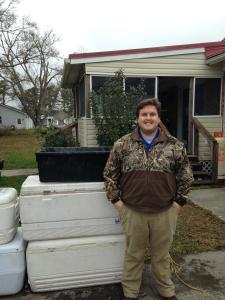Tyler Chadwick

Young Fishermen in the Northeast United States
Interviews with 39 fishers between the ages of 18-35, located along the US East Coast from Maine to North Carolina. Collectively, they represent a wide variety of gear types and fisheries. All had been fishing full-time for at least two years and wanted to make fishing their career. They describe motivations for choosing a fishing career, strategies used, barriers encountered, and facilitating factors that have enabled interviewees to defy the graying trend to become successful fishermen.
Please visit the Voices SoundCloud page to explore clips and stories that relate to this collection.
Sarah Schumann
Tyler Chadwick, 22 years old at the time of the interview, is a waterman in Newport, NC and co-owner of Chadwick's Seafood, a business that focuses on providing fresh North Carolina seafood to customers.. Tyler and his best friend got into fishing together in their teens, and have continued fishing and marketing their catch together ever since.
Scope and Content Note
Tyler Chadwick discusses his background, fishing family history, and his journey into the fishing industry. He talks about how he and his business partner, Norris Hill, started as teenagers running crab pots and gradually expanded into other fisheries like gillnetting and flounder gigging. Tyler emphasizes the importance of addressing environmental issues such as habitat loss and water quality, which he believes are affecting fish populations more than the efforts of small-scale commercial fishermen. He also talks about their decision to start retailing seafood to counter the impact of foreign shrimp being sold as local catch. He discusses that journey establishing Chadwick Seafood. Chadwick also talks about the challenges of being a young fisherman, including financial barriers, the burden of acquiring multiple licenses, and adapting to changing fishing areas and regulations.
Chadwick explains that his business focuses on catching and selling fish to both the wholesale and retail markets, which is unique for young fishermen in his area. He emphasizes the importance of diversifying their business to ensure its success. He also highlights the challenges young fishermen face in getting into the industry due to high costs, lack of funding and financing options, and regulatory barriers. He suggests that the government could help by reducing the cost of permits and licenses and offering support programs, such as apprenticeships or temporary licenses, to help young fishermen get started. He also talks about the impact of natural disasters like hurricanes on the fishing industry and how resilience and networking within the industry are crucial for overcoming challenges.
"Who know’s where the industry is going to be in ten years. Where’s the industry gonna be at in two years? I don’t know where the industry is gonna be at. But I know where we’re gonna be at. We’re gonna be right there with it. We’re strapped in and we’re ready for a roller coaster ride…. Because I’m going to fight for this industry. Because this industry provides for me and my family. And it’s in my blood. So I don’t plan on giving up. I refuse to do that. I’m hard-headed… It’s been extremely hard. But there’s a lot of rewards. I would say probably my biggest reward of it all is not even taking home a paycheck. Now that helps, ‘cause you need the paycheck. But my reward when it comes to all this is when the customer that buys my seafood comes to me week after week after week after week, and says, ‘I can’t get this quality seafood anywhere else. I can’t find this good of a product anywhere.’ And they tell me how much they enjoy it. Not only is that helping our company. That’s helping the industry."
Please Note: The oral histories in this collection are protected by copyright and have been created for educational, research and personal use as described by the Fair Use Doctrine in the U.S. Copyright law. Please reach out Voices@noaa.gov to let us know how these interviews are being used in your research, project, exhibit, etc. The Voices staff can help provide other useful resources related to your inquiry.
The NOAA mission is to understand and predict changes in climate, weather, oceans, and coasts, to share that knowledge and information with others, and to conserve and manage coastal and marine ecosystems and resources. The Voices Oral History Archives offers public access to a wide range of accounts, including historical materials that are products of their particular times, and may contain offensive language or negative stereotypes.
Voices Oral History Archives does not verify the accuracy of materials submitted to us. The opinions expressed in the interviews are those of the interviewee only. The interviews here have been made available to the public only after the interviewer has confirmed that they have obtained consent.
